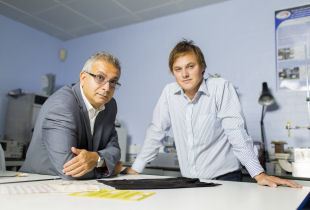A Multi-Sensor Society: LJMU holds prestigious International Sensing Technology Conference
 A milestone event in Liverpool will explore essential research developments for a multi-sensor society. The Eighth International Conference on Sensing Technology (ICST 2014) hosted by LJMU, will support the crucial links between technological devices and the world around them in order to benefit multiple areas from the health care sector through to sporting and military applications.
A milestone event in Liverpool will explore essential research developments for a multi-sensor society. The Eighth International Conference on Sensing Technology (ICST 2014) hosted by LJMU, will support the crucial links between technological devices and the world around them in order to benefit multiple areas from the health care sector through to sporting and military applications.
Liverpool John Moores University is set to welcome researchers, scientists, engineers and practitioners from throughout the world to present the latest research findings, ideas, developments and applications in the area of sensing technology at September 2nd – 4th at the University’s John Lennon Art and Design Building.
The Conference comes not long after it was announced that LJMU and the University of Liverpool have been successful in their bid to create one of four University Enterprise Zones, with £5 million match funding from government. The £15 million facility will house and support new high tech businesses around 'sensor technologies'. 'Sensor City' will help inventions go from the lab to the factory floor even faster, and act as a shop window for foreign investment into the city's high tech start-ups.
Some of the technology which will be explored at the Conference also includes the latest development to monitor patient’s vital signs such as their heart rate, blood oxygen levels and temperature without having to hook them up to a machine. Researchers at LJMU's Built Environment and Sustainable Technologies (BEST) Research Institute invented new electromagnetic wave sensors that can now be woven into any fabric and incorporated into any garment.
While this is still in the early stages of development, the range of potential applications for this wearable sensor technology is immense, not just in the health care sector but also in sporting and military applications. This approach not only saves billions of pounds for national healthcare providers, but also offers better quality of service and even saves lives.
Dr Alex Mason, LJMU Reader in Smart Technologies and ICST 2014 Local Chair commented:
“Nowadays it is hardly possible to imagine our lives without sensors, as they have become essential part of virtually every aspect of human activity. This can be from traffic control or military and surveillance operations, energy and material savings through to areas such as agriculture, health monitoring, natural disaster relief missions and smart sustainable cities. Sensors can help to solve natural disasters such as the UK floods and industrial accidents such as Fukushima in Japan.
“The Conference has attracted hundreds of outstanding research papers from all over the globe, showing the truly international dimension of science and research, in particular sensing technology.
“To ensure that sensor technologies address the rapidly developing needs of various areas of our lives and activities, the scientists, researchers, manufacturers and end-users need to establish an efficient dialogue so that newest technological achievements in all aspects of sensing science and research could be implemented for the benefit of a wide community. This is what the ICST 2014 aims to achieve.”
The ICST 2014 has been organised by the Built Environment and Sustainable Technologies (BEST) Research Institute, Faculty of Technology and Environment, in association with: Liverpool John Moores University Corporate Events and Engagement Team and the European Regional Development Fund (ERDF) Low Carbon Innovation Hub. Sponsors include Rohde and Schwarz, the Institute of Engineering Technology (IET) and the Institute of Physics (IOP).
For a list of all topics and keynote speakers please visit: http://www.ljmu.ac.uk/BLT/BEST/ICST2014/
Interviewee contact details:
Dr Alex Mason, Reader in Smart Technologies
Programme Leader for Smart Technologies for Infrastructure and Buildings (MSc)
Built Environment and Sustainable Technologies (BEST) Research Institute
Liverpool John Moores University
T: 01512312847
M: 07456998777


